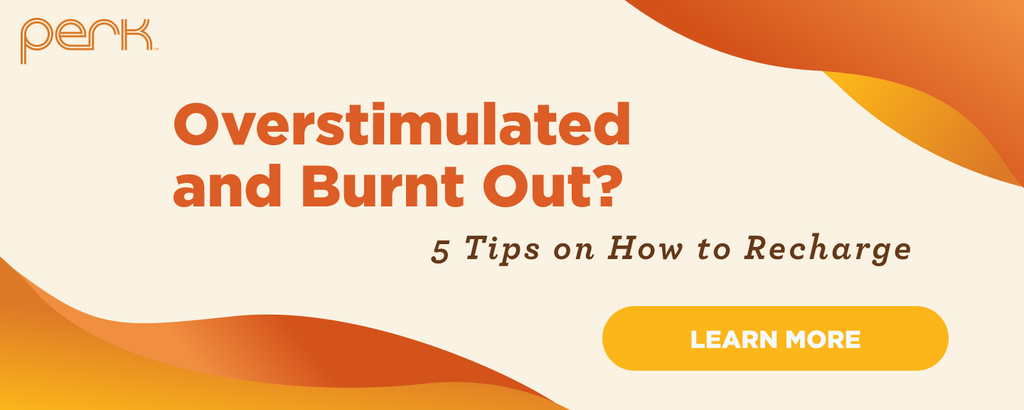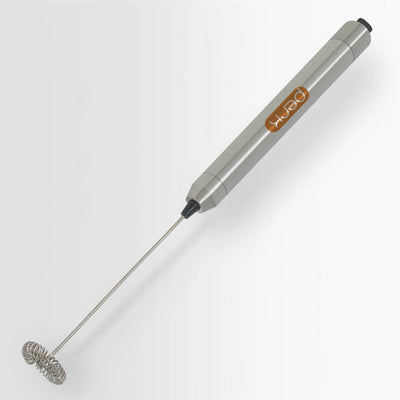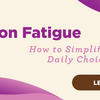Overstimulated and Burnt Out? 5 Tips on How to Recharge


Ever feel like your brain is stuck in overdrive? Like your thoughts are racing, your phone won't stop buzzing, and even the sound of someone chewing nearby makes you want to scream? That's sensory overload—a state where your brain is processing too much at once that could leave you feeling frazzled, foggy, frustrated, or exhausted.
Finding balance in this overstimulated world is essential—sometimes you need energy to power through your day, and other times you need to wind down and find your calm.
That's why we created Perk Energy for those moments when you need a boost†, and Perk Chill for when it's time to reset and recharge.† But supplements are just one piece of the puzzle. Here are five simple ways to recharge when the world feels too loud.
1. Give Your Senses a Break
When your brain is overwhelmed, the best thing you can do is limit the input.
-
Dim the lights. Bright screens and harsh lights add to sensory overload. Try using warm, low lighting in the evening to help your brain wind down.
-
Turn down the noise. Step away from background chatter, lower the volume on your devices, or use noise-canceling headphones if you can’t escape the chaos.
-
Take a visual detox. Close your eyes for a few minutes, step outside for some fresh air, or look at something calming, like a plant or a quiet corner of the room.
Even a few minutes of reduced stimulation can help your nervous system reset.
2. Move Your Body, Gently
When you’re overstimulated, you might feel too wired to sit still but too drained for intense exercise. The solution? Gentle movement.
-
Take a walk. A slow walk without music or podcasts is a good opportunity to just let your brain breathe.
-
Light Stretches. Do a few light stretches or yoga poses to release some tension.
-
Progressive muscle relaxation. Try tensing and releasing different muscle groups to calm your nervous system.
This kind of movement helps discharge built-up energy and re-centers your focus.
3. Schedule “Nothing” Time
Your brain needs white space; a time when nothing is demanding your attention. If your schedule is packed from morning to night, make an effort to build in intentional quiet moments—even if it’s only for a few minutes here and there throughout the day.
-
Pause before switching tasks. Instead of jumping from one thing to the next, take a minute to breathe, stretch, or sip some water before moving on.
-
Set a buffer between work and home. Whether it’s a short walk, listening to music, or just sitting quietly with a cup of something warm (like Perk Chill, of course), a transition ritual helps your brain shift gears and catch up.
-
Block out alone time. Even 10-15 minutes of quiet solitude can make a big difference in recharging your mental energy.
4. Engage in Low-Stimulation Activities
Not all downtime is created equal. Scrolling through social media or watching TV might seem relaxing, but they still bombard your brain with information. Instead, opt for activities that truly let your mind rest.
-
Read a book. Try something light and enjoyable. This is a good time to revisit an old favorite.
-
Try a relaxing hobby. Doodle, knit, or do another simple, hands-on activity.
-
Calming sounds. Listen to instrumental music or nature sounds instead of lyrics or dialogue.
When you give your brain space to slow down, you’ll come back feeling clearer and more refreshed.
5. Fuel Your Body and Mind
Overstimulation isn’t just mental—it can drain you physically, too. Supporting your body helps your brain function better.
-
Stay hydrated. Dehydration can make fatigue and burnout feel much worse.
-
Eat balanced meals. Aim for a balanced meal with protein, healthy fats, and fiber to help keep your energy steady.
-
Sip on something cozy. We recommend a warm cup of Perk Chill to help you unwind and enjoy a moment of peace.†
When your body has what it needs, your mind can handle stimulation more effectively.

Recharge Without Checking Out
You don't need a full vacation to reset (even though we think you deserve one), just small intentional moments of rest throughout your day can make a huge difference. By managing your sensory input, moving gently, and prioritizing real downtime, you can recharge without completely disappearing.
Life isn't getting any quieter—but with the right tools and habits, you can stay grounded in the noise and find the balance between energy and calm that works for you.
†These statements have not been evaluated by the Food and Drug Administration. This product is not intended to diagnose, treat, cure, or prevent any disease


















